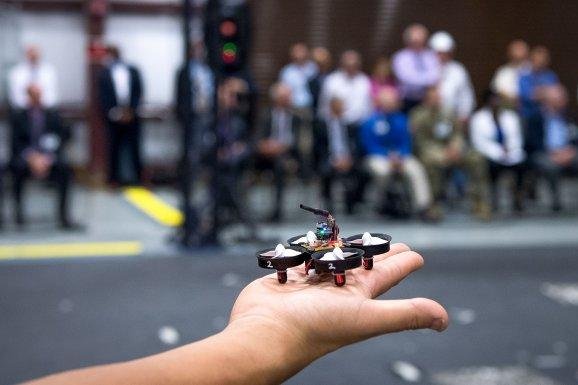A micro quadcopter being demonstrated at Aberdeen Proving Ground in Maryland. U.S. Army photo
Aug. 28 (UPI) -- The U.S. Army announced today it has concluded it's Micro Autonomous Systems and Technology program after a series of tests and demonstrations over the last week.
The program has existed since 2008 and involved the Army Research Laboratory, industry participants and university researchers. It culminated in technology demonstrations at Aberdeen Proving Ground in Maryland Aug. 22-24, including the testing of a swarm of autonomous quadcopters that can assume formations.
"I think there's still a long way to go to get them to do all of the behaviors we want in any type of environment," Army collaborative manager Dr. Brett Piekarski said in a press release.
"There are certain areas where I think we've really pushed the bar and moved the state-of-the-art. One example is in scaling things down to be able to do autonomous behavior in something that fits in the size of your hand."
The project has been conceived as a five-year research alliance that was extended to a decade to develop micro drones that would be capable of coordinating their actions without outside input. It included 19 members of defense industry companies and public and private universities.
"We've demonstrated what can be done in this space with some innovative ideas," Piekarski said.
"There needs to be a lot of work in all of these areas to get them into engineered solutions that we can put in the hands of the Soldiers."
A successor collaborative program called the Distributed Collaborative Intelligent Systems and Technology has recently been announced by the Army.
"The convergence of technology that we're witnessing now, and as we propel it forward, is going to be a dramatic lifesaver and game-changer in terms of the way we operate tactically," said Army senior research specialist Dr. Bran Sadler.
"This is my opinion. I am extremely optimistic."















